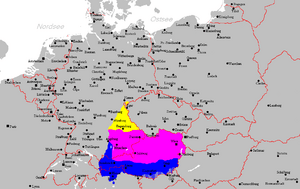Austro-Bavarian language facts for kids
Quick facts for kids Bavarian |
|
|---|---|
| Bairisch | |
| Region | Austria, Bavaria, Germany, Italy |
| Native speakers | 13 million (2005) |
| Language family |
Indo-European
|

Location map of Bavarian
|
|
Bavarian or Austro-Bavarian is a major group of Upper German varieties. They are called "upper" because they are spoken in Switzerland, Austria and southern Germany, which are mountainous. Like standard German, Austro-Bavarian is a High German language, but they are not the same language. However, Austro-Bavarian and Standard German have influenced each other and the vast majority of Austro-Bavarian speakers speak Standard German as well.
Austro-Bavarian is also used to refer to the dialect group which includes the Austro-Bavarian dialect discussed here, as well as the Cimbrian, Hutterite German, and Mócheno dialects of Germany.
Contents
History and origin
The Austro-Bavarian language has its origins in the Germanic tribe known as the Bavarii, who established a tribal duchy, which covered much of what is today Bavaria and some of Austria in the early Middle Ages and was eventually subdued by Charlemagne. However, they gradually migrated down the Danube and into the Alps to all those areas where Austro-Bavarian dialects are spoken.
In German, there is usually a difference made between "bairisch" (referring to the language) and "bayerisch" (referring to the state of Bavaria and used in the name of BMW). Because of King Ludwig I's passion for everything Hellenic, the German name for Bavaria today is spelled "Bayern", while the language spoken there has retained its original spelling "Bairisch"—note the I versus the "Hellenic" Y.
Regions where people speak Bavarian
- in Bavaria:
- in Upper Bavaria
- in Lower Bavaria
- in the Upper Palatinate
- in Austria:
- in all parts of the country except the federal-state of Vorarlberg and parts of the Reutte District in Tirol, where an Alemannic dialect is spoken.
- in Switzerland:
- in the village of Samnaun, in Graubünden.
- in Italy:
- in all of the province of South Tyrol and by small German speaking communities in Trento, Veneto (Cimbrian language) and Friuli.
- in Hungary:
- the city of Sopron (Ödenburg) is officially bi-lingual.
Related pages
Images for kids
See also
 In Spanish: Idioma austro-bávaro para niños
In Spanish: Idioma austro-bávaro para niños



